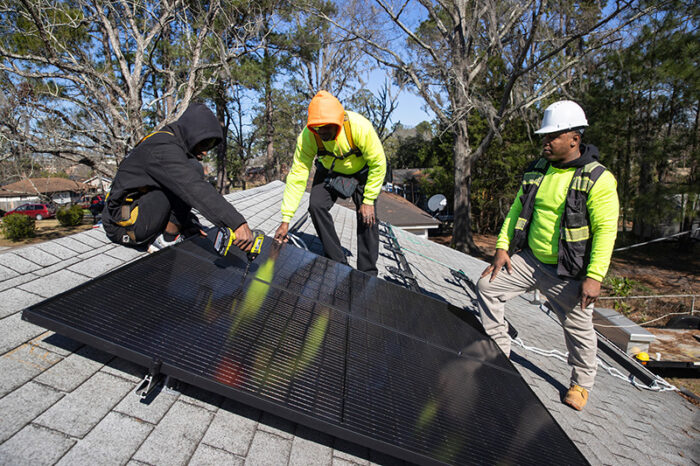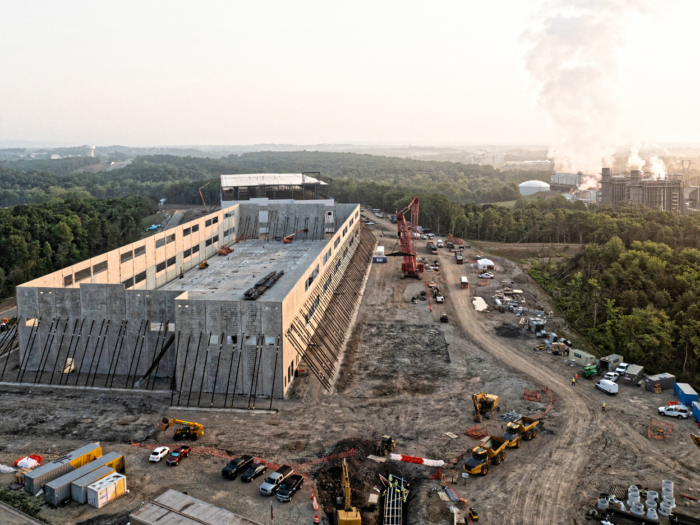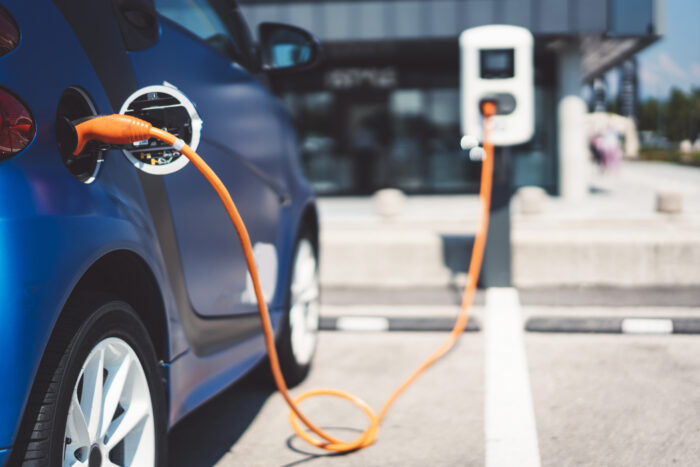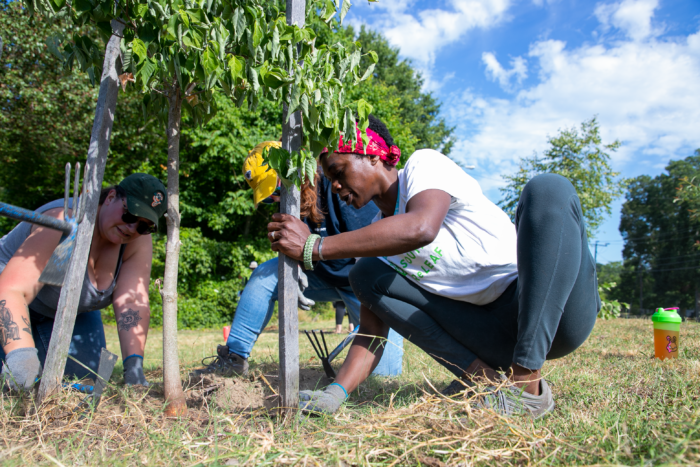Cuts to federal funding harm Southern communities

What’s the impact to the South after a few weeks of the Trump administration’s attacks on assessing and addressing climate risks, including an unlawful freeze on federal funding that is disrupting critical and approved infrastructure, conservation, and health projects? In addition to the impact of massive layoffs of federal workers, these funding freeze actions are raising risks, costs, and uncertainty across our states.
Over the last three years, our region has received over $20 billion in federal funding through the Bipartisan Infrastructure Law and Inflation Reduction Act for an array of projects. Those federal dollars have catalyzed an additional $78 billion in private sector investments and support over 432,000 jobs in our region.
That progress is now caught in the crosshairs of an administration that is committed to dismantling climate progress. Numerous approved grants remain unlawfully frozen in violation of federal court orders. More than 200,000 federal employees have been fired or laid off, and many federal offices are experiencing hiring freezes in a separate effort to slow down the implementation of critical projects. The following projects provide a snapshot of the types of projects that are at risk.

Federal investments create economic opportunity, safety, and jobs in the South
Denying climate solutions to protect our natural resources

The administration has also called into question the largest multistate grant award in EPA’s history, a $421 million effort covering North Carolina, South Carolina, Virginia, and Maryland, to restore coastal wetlands and bottomland forests, improve water quality, and reduce risks of floods, fire, and heat.
South Carolina’s Office of Resilience was awarded $50 million of that grant to alleviate flood risk by acquiring and conserving forested land at risk from development, and The Nature Conservancy (TNC) was awarded $39 million to conserve 25,000 acres of bottomland hardwood forests located along the state’s rivers.
In North Carolina, the funding was on track to restore over 600 acres of coastal habitats, reforest over 55,000 acres, plant 1,200 urban trees, and permanently add 3,300 acres to the North Carolina State Park System. TNC will also help to preserve 33,000 acres of land including the Green Swamp Preserve, which is home to critical natural resources such as longleaf pine savannas with a diverse herb layer including orchids, the Venus flytrap, and other carnivorous plants. The preserve is also home to species such as the red-cockaded woodpecker, American alligator, Bachman’s sparrow, and Hessel’s hairstreak butterfly.
In June 2023, a blaze captured over 15,000 acres of the Green Swamp Preserve. As climate change affects North Carolina’s climate, TNC’s management activities like controlled burning and restoring pine plantations are important to maintain this natural resource for generations to enjoy.
In Virgina, dollars were directed toward preserving wildlife habitat for several animal species, including the Saltmarsh Sparrow which uses coastal wetlands to migrate around the Chesapeake Bay. TNC is also working to acquire land and place development-blocking easements across 36,000 acres of forestland in Southwest Virginia, including Warm Springs Mountain in the Allegheny Highlands, and longleaf pine and tidal wetlands that contain peat – which naturally sequesters carbon.
Withholding promised funds to protect our energy grid

With data center driven electricity demand surging, and storm and temperature extremes accelerating, investments in energy grid resilience are essential to maintaining reliable power for communities. Stronger power grid systems help keep families safe and the power on during extreme weather events.
Uncertainty about funding could jeopardize projects under $691 million in Department of Energy awards through the Grid Resilience State and Tribal Formula Grants – projects that were driving workforce training in grid reliability, identifying areas at high risk of outages, deploying microgrids in Tennessee and Georgia, and deploying battery storage and smart grid technology.
Delaying or repealing funding for energy transmission puts communities at further unnecessary risk. While utilities may go forward with some of the planned projects, absent payments of the promised federal funds, the additional costs and risks could be transferred to customers.
Blocking affordable housing and energy efficiency programs
In North Charleston, South Carolina, a project to provide much-needed healthy, efficient, resilient affordable housing – particularly for seniors – is just getting underway. Awarded funds were lined up to conduct critical home repairs and upgrades at 50 existing homes to reduce soaring energy bills, construct 11 new single-family housing units, and perform workforce training activities within the community.
Slated for Union Heights, South Carolina, a historic Black community that was one of several Black neighborhoods split into two by an overpass highway in the 1960s, the project was part of a larger effort to reconnect previously divided neighborhoods and business districts across the country. The initial units are expected to be built within three years and once sold would help to fund additional homes. This project was funded by a $11.4 million highly competitive Community Change grant from the Environmental Protection Agency (EPA) to the Sustainability Institute, in collaboration with the City of North Charleston.
Reducing transportation pollution

Recent actions by the Trump Administration also have undermined a multiyear effort to expand the national electric vehicle charging network. The Bipartisan Infrastructure Law provided billions of dollars in guaranteed federal funding to increase EV charger availability and reliability, especially in rural areas. But now, two key programs are under threat – the Charging and Fueling Infrastructure (CFI) Grant Program and National Electric Vehicle Infrastructure (NEVI) Formula Program.
In Virginia, federal officials have gone radio silent on a $10 million CFI grant award to the Virginia Department of Energy that would bring more than 400 chargers to rural and underserved communities across the Commonwealth. Meanwhile, the Federal Highway Administration indefinitely “suspended” the NEVI program nationwide, undermining years of work and planning. Southern states, along with every other state in the country, have spent the last few years rolling out this program, only to have the federal government pull the plug just as states began to break ground on their sections of the Interstate EV charging network. Now, more than half a billion dollars promised to Southern states hangs in the balance, leaving officials, local businesses, private investments, and drivers in limbo.
Holding the Trump administration accountable to the law

The orders from the Trump administration have unlawfully and unnecessarily plunged critical climate and infrastructure projects into chaos. Many of the approved federal grants are at varying stages of development and the uncertainty from these orders is already having a profound impact on communities, workers, businesses, nonprofits, and government agencies in the South.
These challenges will have long-term consequences as they slow down the delivery of important services and drive-up costs for localities and families. Delays or cancellations of these and other critical programs mean higher bills and construction costs, worsened risk from floods and extreme heat, and increased costs for our cities and states that can’t delay progress on safe housing, transportation infrastructure and disaster mitigation and recovery.
The IRA and Bipartisan Infrastructure Law brought unprecedented federal and private sector investments to the Southeast. For many areas of the rural South, these laws represent the most significant investment in capacity and infrastructure in decades.
Over the past several years SELC has worked extensively with states, local governments, nonprofits, and frontline communities across the Southeast to maximize the impact of this funding. SELC is committed to continuing to stand with our partners and the people across the South to protect the healthy environment we all depend on.
